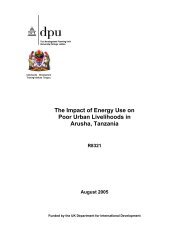EPA Review Annex Documents - DFID
EPA Review Annex Documents - DFID
EPA Review Annex Documents - DFID
You also want an ePaper? Increase the reach of your titles
YUMPU automatically turns print PDFs into web optimized ePapers that Google loves.
which appear to have crowded out activities of other teams. One is the perception of the<br />
generality of the stakeholders about the potential impact of the <strong>EPA</strong> on Nigeria’s<br />
industrialisation, government revenue and the consequent trade relations between Nigeria, the<br />
European Union and Nigeria’s other trading partners. The expected negative impacts have<br />
certainly ensured stakeholders’ vigilance to the various issues being negotiated under the <strong>EPA</strong>.<br />
This attentiveness, demonstrated by civil society organisations involvement in the negotiation<br />
process (in the form of the creation of awareness about the <strong>EPA</strong> negotiations beyond<br />
government officials among industry and farming as well as trading associations) provides<br />
further explanation of the visibility and vigour demonstrated by the <strong>EPA</strong> negotiating team. This is<br />
because it creates pressure on the government negotiating team to really ensure that it<br />
understands fully the negotiating process, issues and implications and carry along non-state<br />
actors. Hence, the team becomes not only relatively proactive, though in a limited sense, in<br />
dealing with many of the negotiation issues but also it ensures that the process in Nigeria<br />
assumes a bottom-up approach. Finally, the advisory and technical arms embedded in the <strong>EPA</strong><br />
negotiating structure are made up of seasoned national professionals and academics of high<br />
integrity that have worked on trade and trade policy-related issues who are available to<br />
interrogate proposals and perform technical analysis though on very short term basis.<br />
Table 2 Composition of Members of the Technical Committee on <strong>EPA</strong><br />
Organisation Number present<br />
Federal Ministry of Commerce and Industry 12 including the Chairperson<br />
Nigeria Export Promotion Council 1<br />
Nigeria Customs Service 2<br />
Ministry of Finance 1<br />
National Association of Nigerian Traders 4<br />
National Bureau of Statistics 1<br />
Nigeria Labour Congress 1<br />
Standards Organization of Nigeria 1<br />
National Association of Chambers of<br />
1<br />
Commerce,<br />
(NACCIMA)<br />
Industry and Agriculture<br />
Others<br />
Source: Minute of <strong>EPA</strong> Technical Committee meeting, 25 June 2009.<br />
3<br />
The <strong>EPA</strong> team also boasts of an agglomeration of few numbers of lawyers and economists who<br />
work together to analyse negotiation issues and examine their socio-economic implications<br />
under mostly external funding support. Finally, perhaps because of the availability of external<br />
resources and better access by the technical committee of <strong>EPA</strong>, more activities are generated<br />
by seeking funding from available donor organisations which have formed part of the negotiating<br />
strategies. The disadvantage of this however, is that in most cases the funding arrives very late<br />
and this negatively affects the effective use of recommendations, apart from the fact that results<br />
of studies are also made available to these external funders who also constitute the opposing<br />
side in the negotiations. Therefore, negotiating strategies are known and responses are<br />
predetermined at the negotiation table. As can be gathered from the composition of the <strong>EPA</strong><br />
Technical Committee, no academician is included, but mostly civil servants and business<br />
membership organizations (BMOs). Academicians have been responsible for carrying out<br />
studies needed to arrive at certain decisions, an example of which constitutes the study on the<br />
selection of Nigeria’s sensitive products and on rules of origin. Apart from discussing the<br />
negotiation issues based on their field and professional experience the civil servants’ role<br />
ensures necessary updates of their ministry’s top echelon about the negotiations. This is to<br />
124
















